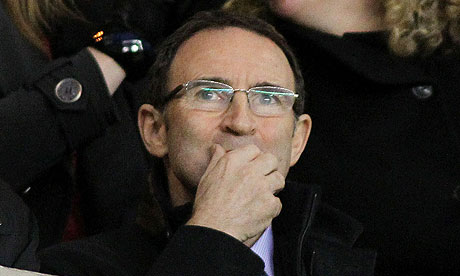
Martin O'Neill had more to think about than the defeat of his new club by Wolves. It is probably as well that the Sunderland manager was simply studying his players here before taking command. The squad knew that he would not be waiting for them in the dressing room but there will certainly be a reckoning at the training ground. His side not only lost but did so after failing with a penalty when already 1-0 in front.
O'Neill's opposite number Mick McCarthy had an experience of complete contrast, revelling in his team's fortitude to fight back for victory. This was a visceral occasion. Both clubs started the day much too close to the relegation zone and Wolves will see this as a memorable match that must still be forgotten quickly as the striving for security goes on.
McCarthy was probably happy with the way in which O'Neill absorbed so much attention before and during the contest. It seemed to give Wolves an extra tenacity. They also bridled at the manner in which Sunderland led. There can have been only the deepest emotional reaction when Sebastian Larsson's penalty in the 72nd minute was saved by Wayne Hennesssy. It had been awarded after a faint challenge by Jody Craddock that made little if any contact on Larsson. The incident also seemed to take place just outside the penalty area.
Sunderland, managed for the day by Eric Black, went ahead through a marvellous drive from Kieran Richardson after 52 minutes. The strike was of such excellence that it ought to have galvanised the side. They broke from a Wolves corner and Larsson found Nicklas Bendtner. The Dane turned the play to the left where Richardson scored with an extraordinary left-footer that sent the ball across the leaping Hennessy and high into the net.
If O'Neill was in any doubt about the defects that led to the dismissal of Steve Bruce, he was soon reminded of them. No manager cares to see an advantage let slip and O'Neill is foremost a pragmatist. His background has seen him gather knowhow initially at some clubs of modest scale. Those years have left in him a permanent respect for the fundamentals of the game. Nor would be expect fortitude and concentration to vanish as if they had been dissolved by the joy of the opener.
Sunderland conceded the equaliser when Fletcher scored with a header from a Matt Jarvis delivery in the 73rd minute. The winner for Wolves came eight minutes later. There were suggestions of a handball by Jamie O'Hara but any connection seemed accidental. Fletcher shot home on the turn.
The Sunderland squad already know how poorly they have performed and time to convince O'Neill could be short if he has access to a significant transfer budget next month. It will be imperative to make signings since the squad lack finesse. Beneath that limitation there lies a lack of confidence that was evident in the way they slipped out of contention here.
Given O'Neill's reputation as a motivator, he seems a suitable appointment for the club. On this occasion, though, it was Wolves who summoned up the sense of purpose that made all the difference.
Given the desperation of these clubs not to deepen their plight the action, at first, had been tentative. Defences were seldom forced to turn in the opening 45 minutes. Shortly before half-time, Stéphane Sessegnon burst through for Sunderland, only for the left-back Stephen Ward to clear his effort from near the goalline.
With O'Neill stirring such interest, there was a risk of forgetting that Wolves entered this fixture in the same poor condition as Sunderland with each club on 11 points, a position providing an unimpeded view of the relegation zone. Action had to be taken and Roger Johnson, a £7m purchase from Birmingham City in the summer, was on the bench, with the 36-year-old Craddock reinstated by Wolves for his first Premier League outing of the season. McCarthy's judgment had been shrewd. O'Neill has much work to do.
In some respects, McCarthy's situation is simpler. Wolves are a grand and historic club but there is no pretending that they can generate riches. The manager ought to be appreciated if he should keep them in the top flight. O'Neill will live in the midst of contrasting circumstances. There is a blend of expectation and agitation at Sunderland. The torment is constant at an institution driven by expectations it keeps on failing to realise.
O'Neill knows a great deal about clubs with large and besotted crowds. He dealt with that during five years at Celtic and kept their ground crammed with adoring fans. That feat may not be repeated so readily in the cut-throat environment of the Premier League but O'Neill was shrewd to ensure that he begins his tenure at Sunderland on Monday and that his real start comes against Blackburn Rovers on Sunday.

